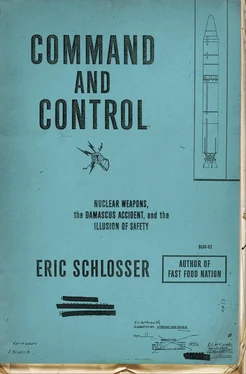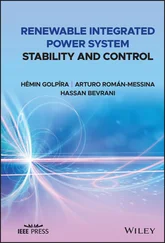As Griffis walked from the plane, VanKirk handed him a radio and said, “Here, somebody wants to talk to you.”
It was General Richard Ellis, the commander in chief of the Strategic Air Command.
“Mr. Griffis, I want to thank you,” Ellis said.
Griffis was impressed that the head of SAC knew his name. He subsequently received a Civilian Medal of Valor. But he didn’t consider himself much of a hero. Climbing into a B-52 that was on fire, without power, in the middle of the night, loaded with nuclear weapons, was no big deal. If you’re an Air Force firefighter, he thought, that’s what you do.
During a closed Senate hearing, Dr. Roger Batzel, the director of the Lawrence Livermore National Laboratory, subsequently testified that if the B-52 had caught on fire, the nuclear weapons inside it could have scattered plutonium over sixty square miles of North Dakota and Minnesota. The city of Grand Forks, with a population of about sixty thousand, would have been directly in the path of the radioactive plume. Batzel failed to mention that one of the Mark 28 bombs could have detonated. It would have destroyed Grand Forks and deposited lethal fallout on Duluth, Minnesota, or Minneapolis — Saint Paul, depending on the high-altitude winds. An Air Force investigation discovered the cause of the fire in engine number five: someone had forgotten to screw a nut onto the fuel strainer. The missing nut was smaller than a penny.
Jeffrey Zink and his crew were taken to the hospital, given drug tests, and kept there until three in the morning. They later resented the obsession, among local newspapers, with the question of whether nuclear weapons had been on the plane. The Air Force would neither confirm nor deny it. The crew focused on a more immediate issue: how easily they could have lost their lives. Some of the bombers on alert that night were parked facing west. Had the nose of their B-52 faced west, the fire would have entered the plane the moment the hatch was opened. They would have been incinerated, and the flames would’ve quickly reached the SRAMs and the Mark 28 bombs. The difference between life and death was their parking space.
Not long after the accident, Zink and his wife were having a romantic, candlelit dinner. They were newlyweds. When his napkin brushed the candle and caught on fire, Zink came unglued. All the feelings that had been suppressed hit him at once. He lost it, he felt like a complete basket case. He didn’t have post-traumatic stress disorder or anything really debilitating, just a sudden realization that was hard to express, without sounding trite. Zink was twenty-five years old, and something abstract had become real. These planes are dangerous, he thought. People die in them.
• • •
THE DAY AFTER THE B-52 fire at Grand Forks, Senator David Pryor once again introduced an amendment to a Senate bill, calling for the installation of warning sirens at every Titan II launch complex. The commander of the 308th Strategic Missile Wing, Colonel Moser, had informed Pryor that at least nine accidents or propellant leaks had occurred at Titan II missile sites in Arkansas during the previous year. At a launch complex near Heber Springs, a steel rod had fallen onto a circuit breaker, starting a fire and endangering the missile. More than one third of the entire Titan II force had been patched for leaks. Pryor’s amendment was cosponsored by Senator Bob Dole, among others, but it was still opposed by the Air Force. “We have a responsibility to protect the civilians living in the communities and on the farms surrounding these missile sites,” Pryor said during the Senate debate. “Accidents have occurred in the past, and we must take steps to reduce their recurrence and provide for the best course of action in case an accident should occur.”
The Air Force had recently submitted a lengthy report to the House and Senate armed services committees, addressing their concerns about the safety of the Titan II. The report acknowledged that the RFHCO suits and the silo’s communications system could be improved. It also noted that the portable vapor detectors did a poor job of detecting fuel vapor and should be replaced. But the Air Force contended that the accident rate at Titan II sites was lower than the rate at most American workplaces, that current maintenance procedures “provide a high level of safety,” and that the physical condition of the missile was “considered by many to be better now than when it was new.” The safety record of the W-53 warhead was “commendable,” the report said — without mentioning that even the Pentagon thought it needed a retrofit to be safe in abnormal environments. The Air Force argued that the risk of a major propellant leak was low, because the Titan II’s fuel tanks and oxidizer tanks were so well maintained. “Airframe rupture,” the report concluded, “therefore does not constitute a viable concern.”
The Air Force report was useful not only to the Strategic Air Command, which hoped to keep the Titan II on alert, but also to the defense contractors responsible for the missile, like Martin Marietta. They were being sued by Airman Carl Malinger and other victims of the oxidizer leak at Rock, Kansas. But the report didn’t help the Air Force in the Senate. Pryor’s amendment was approved on September 16, 1980, almost a year after it had first been introduced.
Skip Rutherford and his wife were at home, having dinner with an old friend, a couple of days later, when the phone rang. Rutherford got up, took the call, and returned to the table looking white as a ghost.
His wife asked what was wrong.
Somebody dropped a socket in a Titan II silo near Damascus, Rutherford said. The skin of the missile has been pierced, and fuel’s leaking out. The guy who just called says the missile’s going to explode.
Rutherford phoned Senator Pryor, who was in Hot Springs, Arkansas, for the state Democratic convention, along with Governor Bill Clinton and Vice President Walter Mondale.
“This is serious,” Rutherford told the senator.
“Well, how serious?”
“They tell me it’s going to explode.”
“You’re kidding me.”
Outside Rutherford’s house, cars were driving past, kids were playing in yards — and none of them seemed to know that a nuclear disaster might be unfolding, just fifty miles away. Rutherford thought the whole thing was surreal. If the missile did explode, would the warhead detonate? Was the state of Arkansas really about to be wiped off the map? After the conversation with Senator Pryor, the phone at the house kept ringing. The calls were from other staff members, journalists, and the airmen who’d secretly been warning him about the Titan II for months. They said the missile was going to explode, and they hadn’t been wrong yet.
The television was on in the living room, and Rutherford noticed that a good friend of his, Frank Thomas, a twenty-seven-year-old correspondent for Channel 7, was standing across the road from the Titan II site in Damascus. He was repeating the Air Force claim that everything was under control. Rutherford picked up the phone and called Bob Steele, the news director at Channel 7.
“Bob, listen to me,” Rutherford said. “This is totally off the record, but you tell Frank to get the hell out of there.”
“What?”
“Tell Frank to get the hell out of there. He is a friend of mine, and that missile, Bob, is going to explode.”
“How do you know?”
“You have your sources, I have mine,” Rutherford said, beginning to feel a little frantic. “And I’m just telling you, I’m sitting over here watching my friend Frank Thomas on your station standing right before a death trap. And I don’t have a way to get to him, but you all do, and you’ve got to get him out of there.”
Читать дальше












